An Analysis of Teen Alcohol Abuse: Causes and Long-Term Consequences
VerifiedAdded on 2019/09/26
|6
|1485
|1444
Essay
AI Summary
This essay delves into the multifaceted issue of alcohol abuse among teenagers, exploring the key contributing factors and their detrimental consequences. The analysis begins by identifying peer expectations and behavior and the family environment as primary drivers of alcohol abuse, emphasizing the significant influence of social norms and familial dynamics on adolescent choices. The essay then assesses the health and social effects, specifically focusing on alcohol-related aggression, violence, and the damaging impact on brain function. It highlights how excessive alcohol consumption can lead to antisocial behavior, violent acts, and cognitive impairments, including memory problems and difficulties with problem-solving. Furthermore, the essay underscores the long-term health risks associated with alcohol abuse, such as organ damage and diseases, while emphasizing the importance of awareness regarding the consequences of early alcohol abuse.
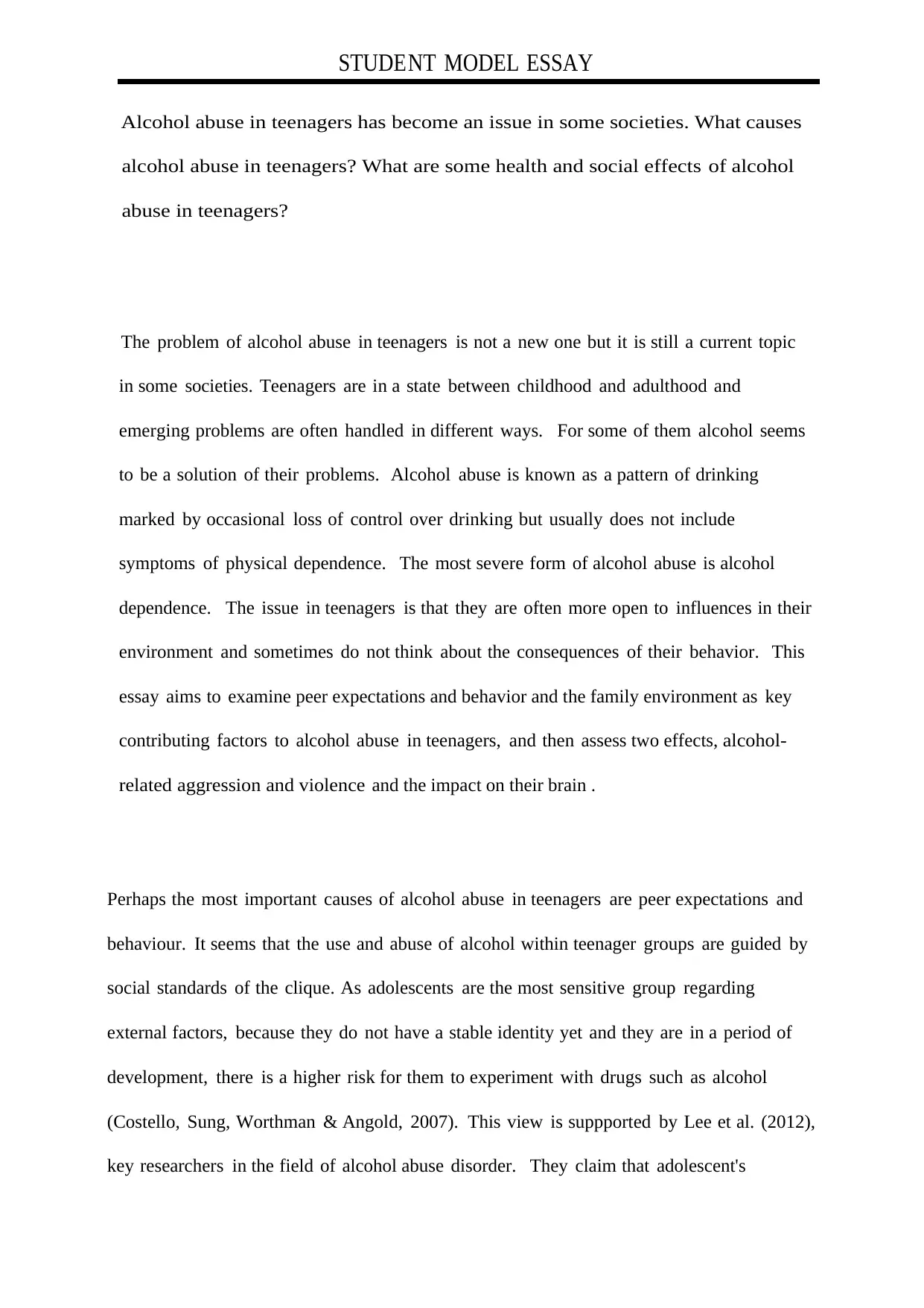
STUDENT MODEL ESSAY
Alcohol abuse in teenagers has become an issue in some societies. What causes
alcohol abuse in teenagers? What are some health and social effects of alcohol
abuse in teenagers?
The problem of alcohol abuse in teenagers is not a new one but it is still a current topic
in some societies. Teenagers are in a state between childhood and adulthood and
emerging problems are often handled in different ways. For some of them alcohol seems
to be a solution of their problems. Alcohol abuse is known as a pattern of drinking
marked by occasional loss of control over drinking but usually does not include
symptoms of physical dependence. The most severe form of alcohol abuse is alcohol
dependence. The issue in teenagers is that they are often more open to influences in their
environment and sometimes do not think about the consequences of their behavior. This
essay aims to examine peer expectations and behavior and the family environment as key
contributing factors to alcohol abuse in teenagers, and then assess two effects, alcohol-
related aggression and violence and the impact on their brain .
Perhaps the most important causes of alcohol abuse in teenagers are peer expectations and
behaviour. It seems that the use and abuse of alcohol within teenager groups are guided by
social standards of the clique. As adolescents are the most sensitive group regarding
external factors, because they do not have a stable identity yet and they are in a period of
development, there is a higher risk for them to experiment with drugs such as alcohol
(Costello, Sung, Worthman & Angold, 2007). This view is suppported by Lee et al. (2012),
key researchers in the field of alcohol abuse disorder. They claim that adolescent's
Alcohol abuse in teenagers has become an issue in some societies. What causes
alcohol abuse in teenagers? What are some health and social effects of alcohol
abuse in teenagers?
The problem of alcohol abuse in teenagers is not a new one but it is still a current topic
in some societies. Teenagers are in a state between childhood and adulthood and
emerging problems are often handled in different ways. For some of them alcohol seems
to be a solution of their problems. Alcohol abuse is known as a pattern of drinking
marked by occasional loss of control over drinking but usually does not include
symptoms of physical dependence. The most severe form of alcohol abuse is alcohol
dependence. The issue in teenagers is that they are often more open to influences in their
environment and sometimes do not think about the consequences of their behavior. This
essay aims to examine peer expectations and behavior and the family environment as key
contributing factors to alcohol abuse in teenagers, and then assess two effects, alcohol-
related aggression and violence and the impact on their brain .
Perhaps the most important causes of alcohol abuse in teenagers are peer expectations and
behaviour. It seems that the use and abuse of alcohol within teenager groups are guided by
social standards of the clique. As adolescents are the most sensitive group regarding
external factors, because they do not have a stable identity yet and they are in a period of
development, there is a higher risk for them to experiment with drugs such as alcohol
(Costello, Sung, Worthman & Angold, 2007). This view is suppported by Lee et al. (2012),
key researchers in the field of alcohol abuse disorder. They claim that adolescent's
Paraphrase This Document
Need a fresh take? Get an instant paraphrase of this document with our AI Paraphraser
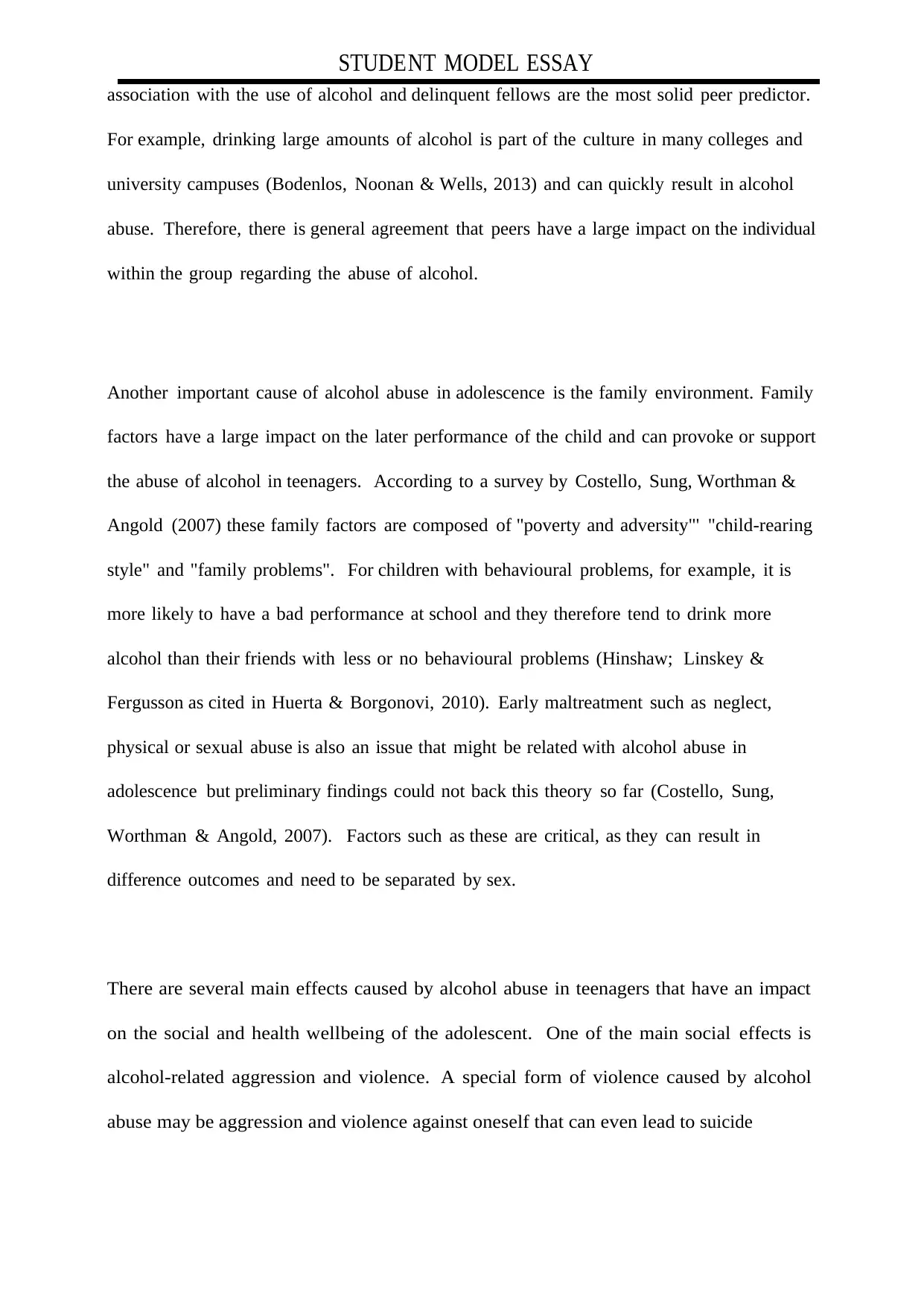
STUDENT MODEL ESSAY
association with the use of alcohol and delinquent fellows are the most solid peer predictor.
For example, drinking large amounts of alcohol is part of the culture in many colleges and
university campuses (Bodenlos, Noonan & Wells, 2013) and can quickly result in alcohol
abuse. Therefore, there is general agreement that peers have a large impact on the individual
within the group regarding the abuse of alcohol.
Another important cause of alcohol abuse in adolescence is the family environment. Family
factors have a large impact on the later performance of the child and can provoke or support
the abuse of alcohol in teenagers. According to a survey by Costello, Sung, Worthman &
Angold (2007) these family factors are composed of "poverty and adversity"' "child-rearing
style" and "family problems". For children with behavioural problems, for example, it is
more likely to have a bad performance at school and they therefore tend to drink more
alcohol than their friends with less or no behavioural problems (Hinshaw; Linskey &
Fergusson as cited in Huerta & Borgonovi, 2010). Early maltreatment such as neglect,
physical or sexual abuse is also an issue that might be related with alcohol abuse in
adolescence but preliminary findings could not back this theory so far (Costello, Sung,
Worthman & Angold, 2007). Factors such as these are critical, as they can result in
difference outcomes and need to be separated by sex.
There are several main effects caused by alcohol abuse in teenagers that have an impact
on the social and health wellbeing of the adolescent. One of the main social effects is
alcohol-related aggression and violence. A special form of violence caused by alcohol
abuse may be aggression and violence against oneself that can even lead to suicide
association with the use of alcohol and delinquent fellows are the most solid peer predictor.
For example, drinking large amounts of alcohol is part of the culture in many colleges and
university campuses (Bodenlos, Noonan & Wells, 2013) and can quickly result in alcohol
abuse. Therefore, there is general agreement that peers have a large impact on the individual
within the group regarding the abuse of alcohol.
Another important cause of alcohol abuse in adolescence is the family environment. Family
factors have a large impact on the later performance of the child and can provoke or support
the abuse of alcohol in teenagers. According to a survey by Costello, Sung, Worthman &
Angold (2007) these family factors are composed of "poverty and adversity"' "child-rearing
style" and "family problems". For children with behavioural problems, for example, it is
more likely to have a bad performance at school and they therefore tend to drink more
alcohol than their friends with less or no behavioural problems (Hinshaw; Linskey &
Fergusson as cited in Huerta & Borgonovi, 2010). Early maltreatment such as neglect,
physical or sexual abuse is also an issue that might be related with alcohol abuse in
adolescence but preliminary findings could not back this theory so far (Costello, Sung,
Worthman & Angold, 2007). Factors such as these are critical, as they can result in
difference outcomes and need to be separated by sex.
There are several main effects caused by alcohol abuse in teenagers that have an impact
on the social and health wellbeing of the adolescent. One of the main social effects is
alcohol-related aggression and violence. A special form of violence caused by alcohol
abuse may be aggression and violence against oneself that can even lead to suicide
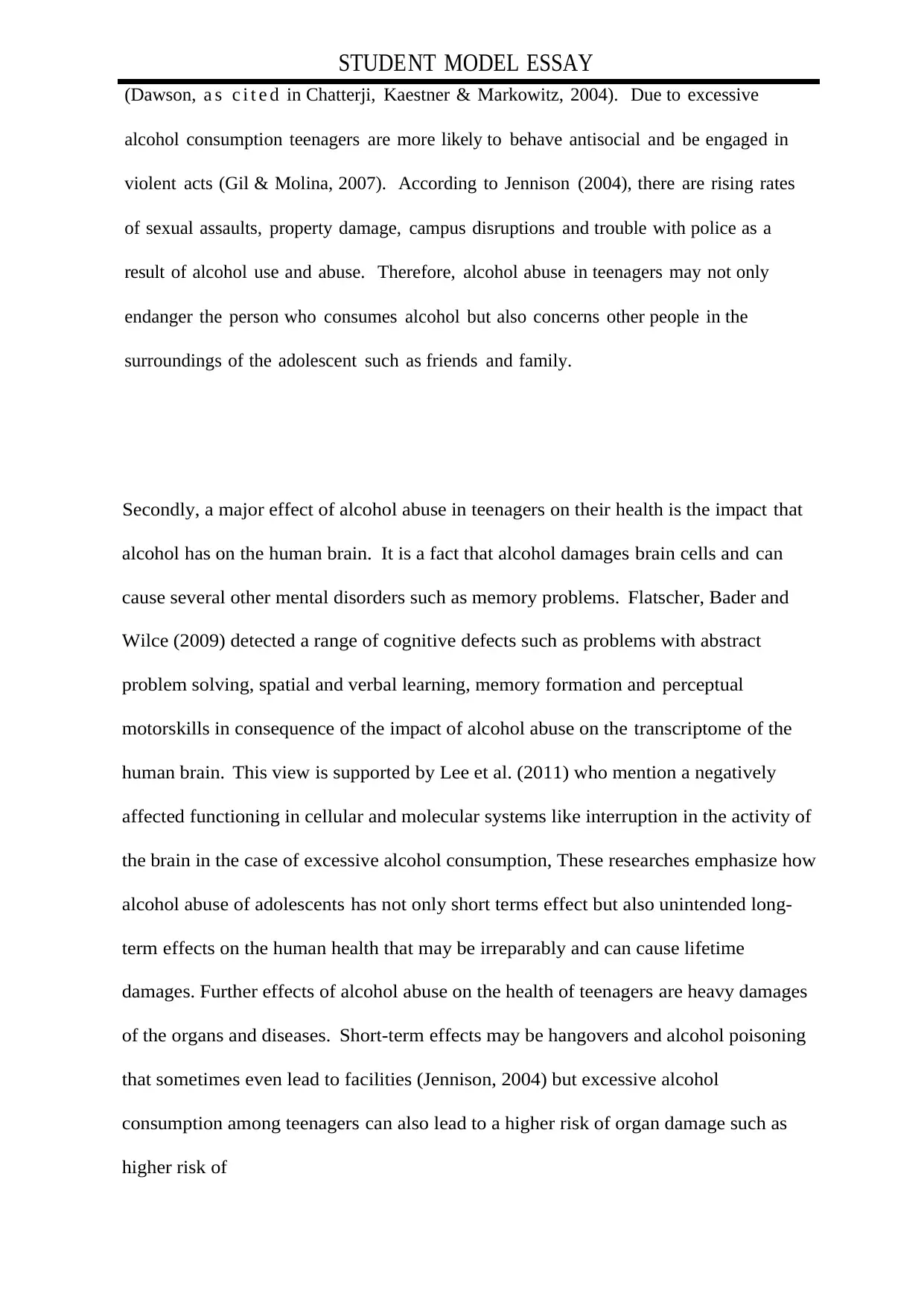
STUDENT MODEL ESSAY
(Dawson, a s c i t e d in Chatterji, Kaestner & Markowitz, 2004). Due to excessive
alcohol consumption teenagers are more likely to behave antisocial and be engaged in
violent acts (Gil & Molina, 2007). According to Jennison (2004), there are rising rates
of sexual assaults, property damage, campus disruptions and trouble with police as a
result of alcohol use and abuse. Therefore, alcohol abuse in teenagers may not only
endanger the person who consumes alcohol but also concerns other people in the
surroundings of the adolescent such as friends and family.
Secondly, a major effect of alcohol abuse in teenagers on their health is the impact that
alcohol has on the human brain. It is a fact that alcohol damages brain cells and can
cause several other mental disorders such as memory problems. Flatscher, Bader and
Wilce (2009) detected a range of cognitive defects such as problems with abstract
problem solving, spatial and verbal learning, memory formation and perceptual
motorskills in consequence of the impact of alcohol abuse on the transcriptome of the
human brain. This view is supported by Lee et al. (2011) who mention a negatively
affected functioning in cellular and molecular systems like interruption in the activity of
the brain in the case of excessive alcohol consumption, These researches emphasize how
alcohol abuse of adolescents has not only short terms effect but also unintended long-
term effects on the human health that may be irreparably and can cause lifetime
damages. Further effects of alcohol abuse on the health of teenagers are heavy damages
of the organs and diseases. Short-term effects may be hangovers and alcohol poisoning
that sometimes even lead to facilities (Jennison, 2004) but excessive alcohol
consumption among teenagers can also lead to a higher risk of organ damage such as
higher risk of
(Dawson, a s c i t e d in Chatterji, Kaestner & Markowitz, 2004). Due to excessive
alcohol consumption teenagers are more likely to behave antisocial and be engaged in
violent acts (Gil & Molina, 2007). According to Jennison (2004), there are rising rates
of sexual assaults, property damage, campus disruptions and trouble with police as a
result of alcohol use and abuse. Therefore, alcohol abuse in teenagers may not only
endanger the person who consumes alcohol but also concerns other people in the
surroundings of the adolescent such as friends and family.
Secondly, a major effect of alcohol abuse in teenagers on their health is the impact that
alcohol has on the human brain. It is a fact that alcohol damages brain cells and can
cause several other mental disorders such as memory problems. Flatscher, Bader and
Wilce (2009) detected a range of cognitive defects such as problems with abstract
problem solving, spatial and verbal learning, memory formation and perceptual
motorskills in consequence of the impact of alcohol abuse on the transcriptome of the
human brain. This view is supported by Lee et al. (2011) who mention a negatively
affected functioning in cellular and molecular systems like interruption in the activity of
the brain in the case of excessive alcohol consumption, These researches emphasize how
alcohol abuse of adolescents has not only short terms effect but also unintended long-
term effects on the human health that may be irreparably and can cause lifetime
damages. Further effects of alcohol abuse on the health of teenagers are heavy damages
of the organs and diseases. Short-term effects may be hangovers and alcohol poisoning
that sometimes even lead to facilities (Jennison, 2004) but excessive alcohol
consumption among teenagers can also lead to a higher risk of organ damage such as
higher risk of
⊘ This is a preview!⊘
Do you want full access?
Subscribe today to unlock all pages.

Trusted by 1+ million students worldwide
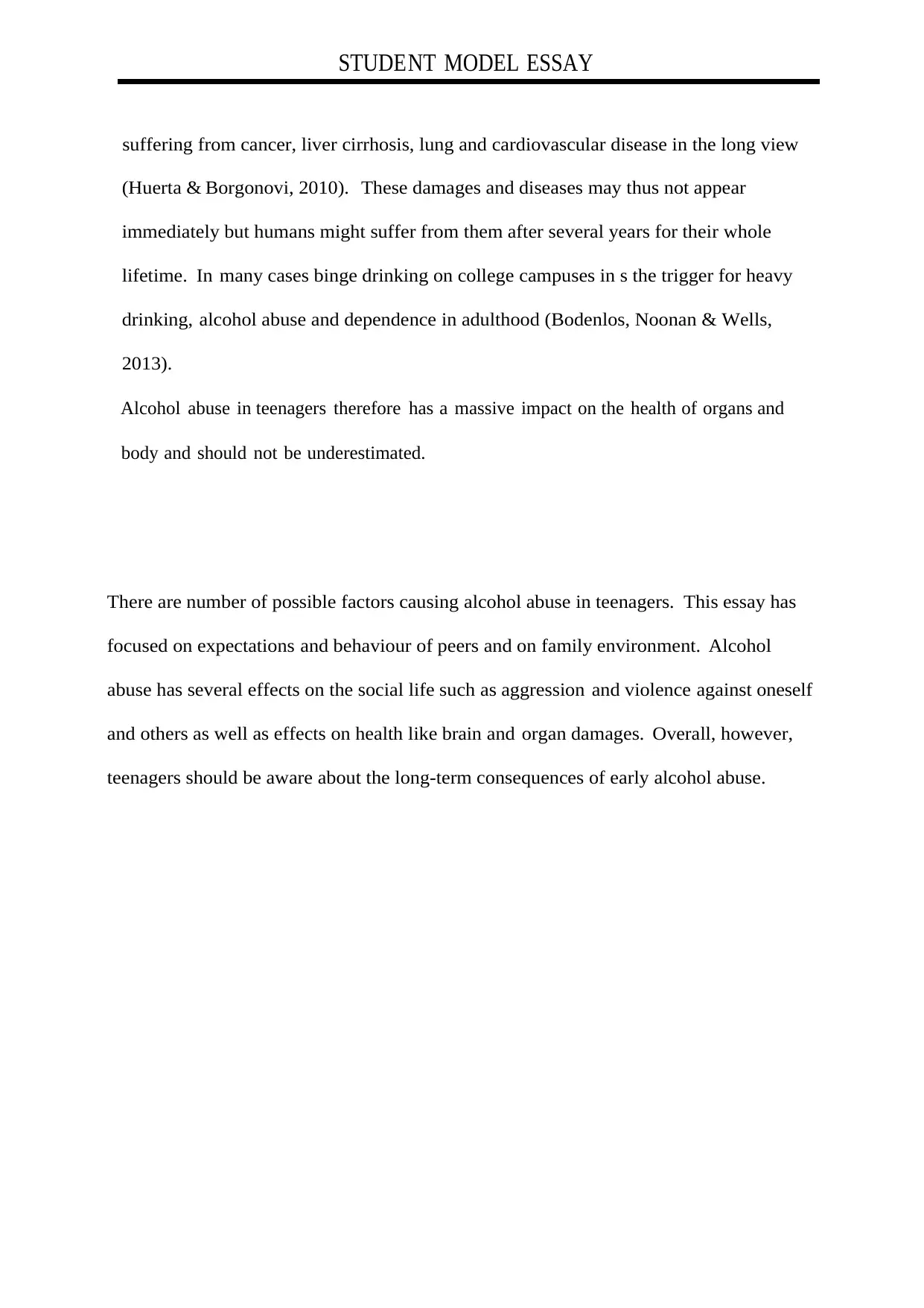
STUDENT MODEL ESSAY
suffering from cancer, liver cirrhosis, lung and cardiovascular disease in the long view
(Huerta & Borgonovi, 2010). These damages and diseases may thus not appear
immediately but humans might suffer from them after several years for their whole
lifetime. In many cases binge drinking on college campuses in s the trigger for heavy
drinking, alcohol abuse and dependence in adulthood (Bodenlos, Noonan & Wells,
2013).
Alcohol abuse in teenagers therefore has a massive impact on the health of organs and
body and should not be underestimated.
There are number of possible factors causing alcohol abuse in teenagers. This essay has
focused on expectations and behaviour of peers and on family environment. Alcohol
abuse has several effects on the social life such as aggression and violence against oneself
and others as well as effects on health like brain and organ damages. Overall, however,
teenagers should be aware about the long-term consequences of early alcohol abuse.
suffering from cancer, liver cirrhosis, lung and cardiovascular disease in the long view
(Huerta & Borgonovi, 2010). These damages and diseases may thus not appear
immediately but humans might suffer from them after several years for their whole
lifetime. In many cases binge drinking on college campuses in s the trigger for heavy
drinking, alcohol abuse and dependence in adulthood (Bodenlos, Noonan & Wells,
2013).
Alcohol abuse in teenagers therefore has a massive impact on the health of organs and
body and should not be underestimated.
There are number of possible factors causing alcohol abuse in teenagers. This essay has
focused on expectations and behaviour of peers and on family environment. Alcohol
abuse has several effects on the social life such as aggression and violence against oneself
and others as well as effects on health like brain and organ damages. Overall, however,
teenagers should be aware about the long-term consequences of early alcohol abuse.
Paraphrase This Document
Need a fresh take? Get an instant paraphrase of this document with our AI Paraphraser
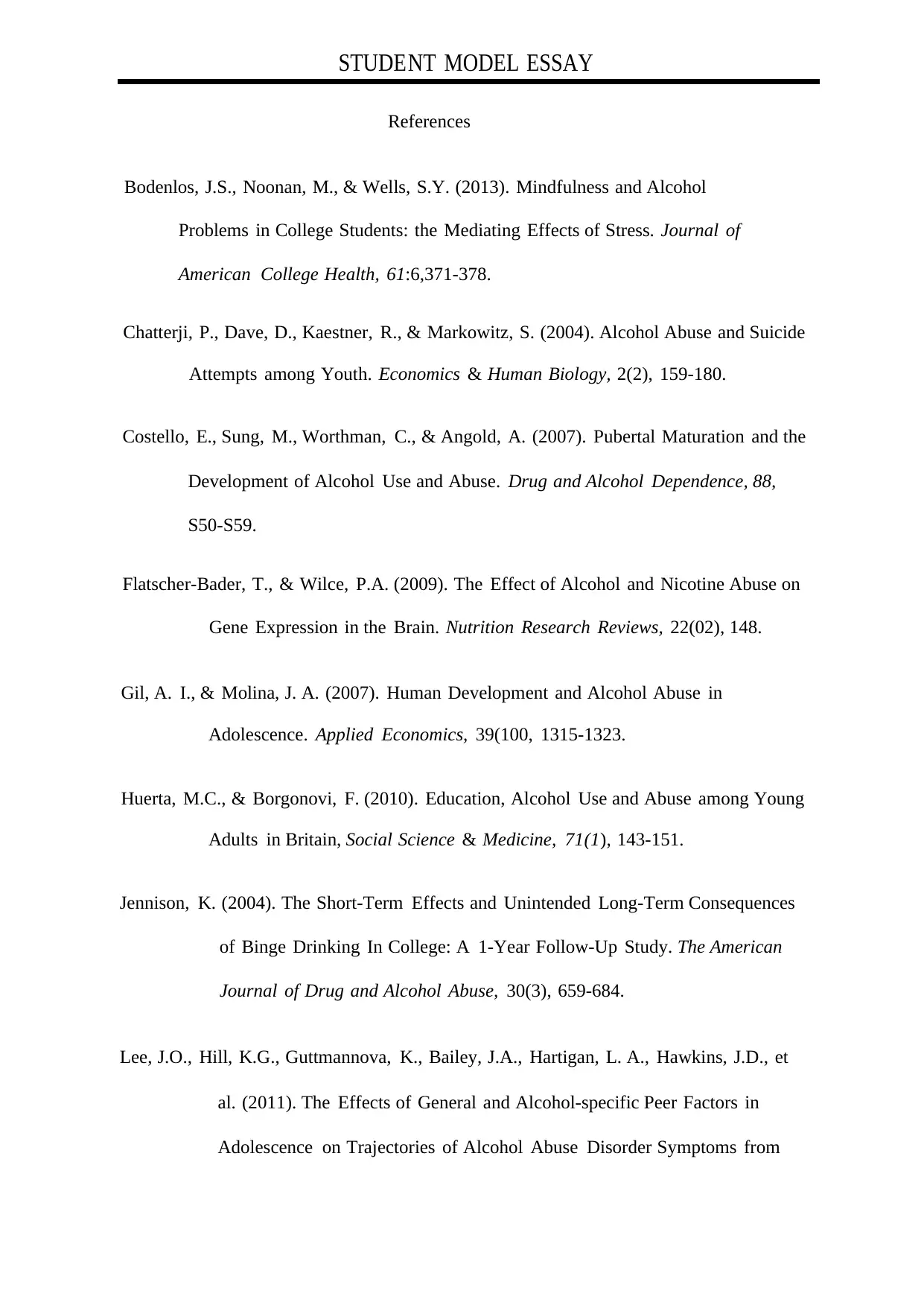
STUDENT MODEL ESSAY
References
Bodenlos, J.S., Noonan, M., & Wells, S.Y. (2013). Mindfulness and Alcohol
Problems in College Students: the Mediating Effects of Stress. Journal of
American College Health, 61:6,371-378.
Chatterji, P., Dave, D., Kaestner, R., & Markowitz, S. (2004). Alcohol Abuse and Suicide
Attempts among Youth. Economics & Human Biology, 2(2), 159-180.
Costello, E., Sung, M., Worthman, C., & Angold, A. (2007). Pubertal Maturation and the
Development of Alcohol Use and Abuse. Drug and Alcohol Dependence, 88,
S50-S59.
Flatscher-Bader, T., & Wilce, P.A. (2009). The Effect of Alcohol and Nicotine Abuse on
Gene Expression in the Brain. Nutrition Research Reviews, 22(02), 148.
Gil, A. I., & Molina, J. A. (2007). Human Development and Alcohol Abuse in
Adolescence. Applied Economics, 39(100, 1315-1323.
Huerta, M.C., & Borgonovi, F. (2010). Education, Alcohol Use and Abuse among Young
Adults in Britain, Social Science & Medicine, 71(1), 143-151.
Jennison, K. (2004). The Short-Term Effects and Unintended Long-Term Consequences
of Binge Drinking In College: A 1-Year Follow-Up Study. The American
Journal of Drug and Alcohol Abuse, 30(3), 659-684.
Lee, J.O., Hill, K.G., Guttmannova, K., Bailey, J.A., Hartigan, L. A., Hawkins, J.D., et
al. (2011). The Effects of General and Alcohol-specific Peer Factors in
Adolescence on Trajectories of Alcohol Abuse Disorder Symptoms from
References
Bodenlos, J.S., Noonan, M., & Wells, S.Y. (2013). Mindfulness and Alcohol
Problems in College Students: the Mediating Effects of Stress. Journal of
American College Health, 61:6,371-378.
Chatterji, P., Dave, D., Kaestner, R., & Markowitz, S. (2004). Alcohol Abuse and Suicide
Attempts among Youth. Economics & Human Biology, 2(2), 159-180.
Costello, E., Sung, M., Worthman, C., & Angold, A. (2007). Pubertal Maturation and the
Development of Alcohol Use and Abuse. Drug and Alcohol Dependence, 88,
S50-S59.
Flatscher-Bader, T., & Wilce, P.A. (2009). The Effect of Alcohol and Nicotine Abuse on
Gene Expression in the Brain. Nutrition Research Reviews, 22(02), 148.
Gil, A. I., & Molina, J. A. (2007). Human Development and Alcohol Abuse in
Adolescence. Applied Economics, 39(100, 1315-1323.
Huerta, M.C., & Borgonovi, F. (2010). Education, Alcohol Use and Abuse among Young
Adults in Britain, Social Science & Medicine, 71(1), 143-151.
Jennison, K. (2004). The Short-Term Effects and Unintended Long-Term Consequences
of Binge Drinking In College: A 1-Year Follow-Up Study. The American
Journal of Drug and Alcohol Abuse, 30(3), 659-684.
Lee, J.O., Hill, K.G., Guttmannova, K., Bailey, J.A., Hartigan, L. A., Hawkins, J.D., et
al. (2011). The Effects of General and Alcohol-specific Peer Factors in
Adolescence on Trajectories of Alcohol Abuse Disorder Symptoms from
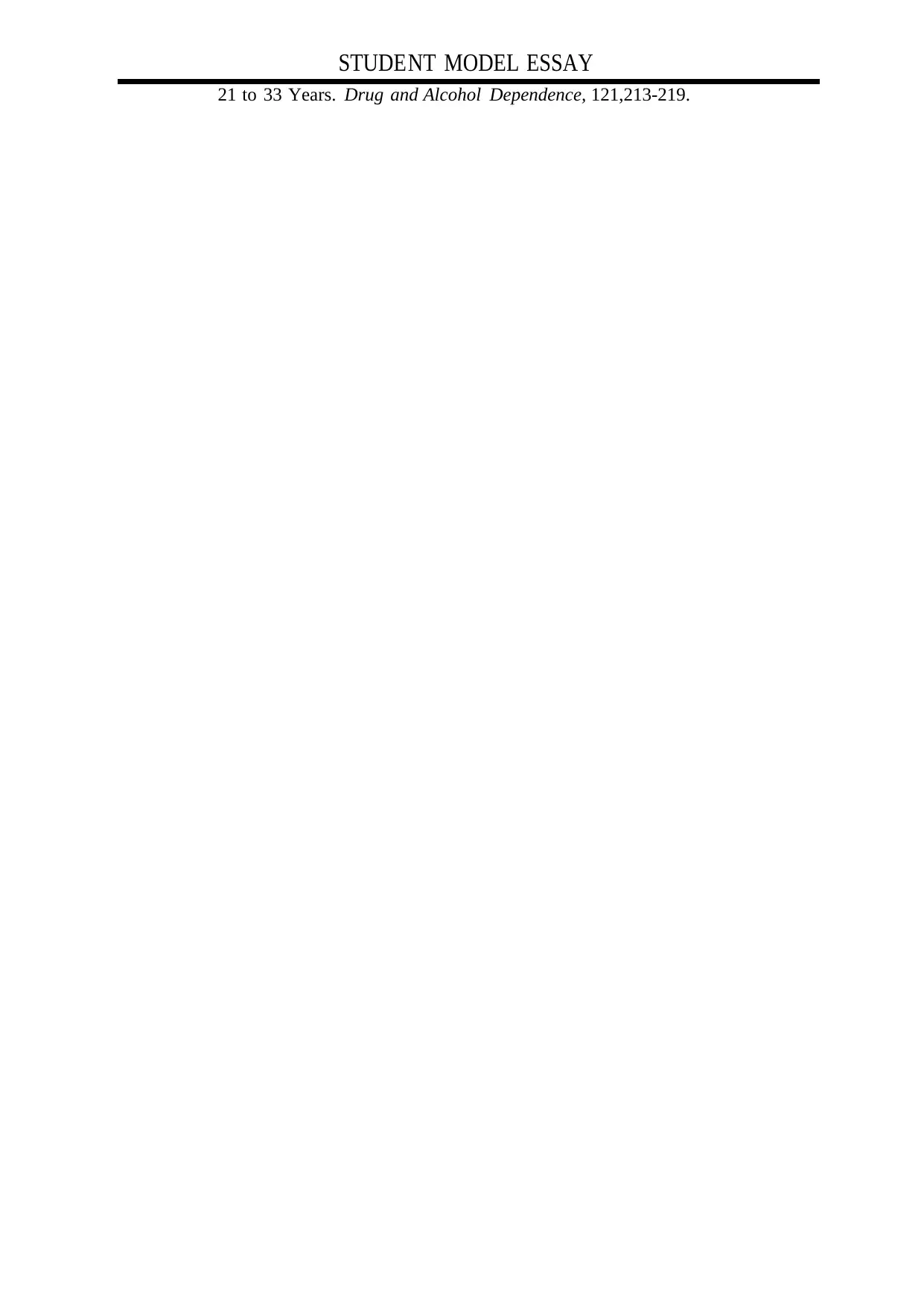
STUDENT MODEL ESSAY
21 to 33 Years. Drug and Alcohol Dependence, 121,213-219.
21 to 33 Years. Drug and Alcohol Dependence, 121,213-219.
⊘ This is a preview!⊘
Do you want full access?
Subscribe today to unlock all pages.

Trusted by 1+ million students worldwide
1 out of 6
Related Documents
Your All-in-One AI-Powered Toolkit for Academic Success.
+13062052269
info@desklib.com
Available 24*7 on WhatsApp / Email
![[object Object]](/_next/static/media/star-bottom.7253800d.svg)
Unlock your academic potential
Copyright © 2020–2025 A2Z Services. All Rights Reserved. Developed and managed by ZUCOL.





